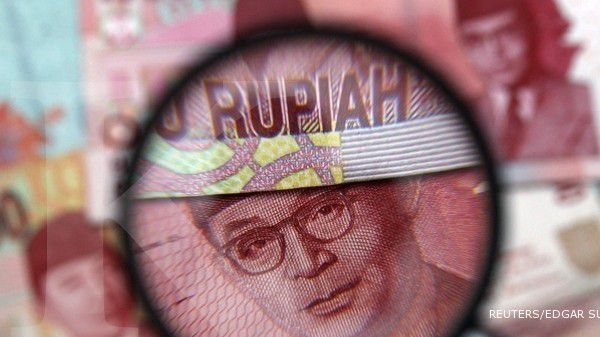JAKARTA. The rupiah strengthened along with the release of positive economic data from the Central Statistics Agency (BPS). BPS announced, in February 2014 the trade balance had a surplus of US $ 785.3 million, while inflation in March 2014 is only 0.08 %. On an annual basis (year on year) the inflation reached 7.32% This news brings a fresh breeze for financial market. The rupiah exchange rate in Bank Indonesia rose Rp 133 points to Rp 11,271 per US dollar on Tuesday (1/4). On Friday (28/3), rupiah was still closed at Rp 11,404 per US dollar.However, this will not last long. It is because there is a risk of large amounts of dollar demand from foreign corporations in the next few months. They must deposit the profits to shareholders abroad. As a result, the rupiah could weaken again.BII chief economist Juniman admitted, repatriation of foreign corporate profits will push the exchange rate in the second quarter of this year. He warned, based on Indonesia’s balance of payments (BOP) data, occurred every year, in the second quarter, repatriation income of approximately U.S. $ 7 billion. Consequently rupiah will experience considerable pressure. As a result, "By the end of the second quarter we expect the exchange rate back to Rp 11,500 again," said Juniman, yesterday.Samuel Asset Management economist Lana Soelistianingsih said, the government should immediately issue a policy package that provides incentives for foreign companies who want to invest their funds back to Indonesia. Incentives such as these are expected to be able to prevent capital outflow. Prepare anticipationHowever, if the legislative and presidential elections run smoothly, Lana estimates, some foreign funds could be returned to Indonesia. These capital inflows are expected to compensate for the weakening of dollars due to the repatriation of profits by foreign investors -owned enterprise. "By June of dollars could bounce back to level Rp 11.000 - 11.500," said Lana. Finance Minister Chatib Basri believes, the strengthening of the rupiah will continue. He said, exports- imports in February 2014 has exceeded government expectations. Initially he expected the trade surplus was only about U.S. $ 500 million. "If economic data is good, rupiah could be better," Chatib said.Surplus occurs because the export of oil and gas (oil) up slightly, from U.S. $ 2.5 billion in January to U.S. $ 2.66 billion. At the same time, oil imports fell from U.S. $ 3.55 billion to U.S. $ 3.46 billion. Non-oil imports also fell from U.S. $ 11.37 to U.S. $ 10.33 billion.
Dollar Demand from Companies Threaten Rupiah
JAKARTA. The rupiah strengthened along with the release of positive economic data from the Central Statistics Agency (BPS). BPS announced, in February 2014 the trade balance had a surplus of US $ 785.3 million, while inflation in March 2014 is only 0.08 %. On an annual basis (year on year) the inflation reached 7.32% This news brings a fresh breeze for financial market. The rupiah exchange rate in Bank Indonesia rose Rp 133 points to Rp 11,271 per US dollar on Tuesday (1/4). On Friday (28/3), rupiah was still closed at Rp 11,404 per US dollar.However, this will not last long. It is because there is a risk of large amounts of dollar demand from foreign corporations in the next few months. They must deposit the profits to shareholders abroad. As a result, the rupiah could weaken again.BII chief economist Juniman admitted, repatriation of foreign corporate profits will push the exchange rate in the second quarter of this year. He warned, based on Indonesia’s balance of payments (BOP) data, occurred every year, in the second quarter, repatriation income of approximately U.S. $ 7 billion. Consequently rupiah will experience considerable pressure. As a result, "By the end of the second quarter we expect the exchange rate back to Rp 11,500 again," said Juniman, yesterday.Samuel Asset Management economist Lana Soelistianingsih said, the government should immediately issue a policy package that provides incentives for foreign companies who want to invest their funds back to Indonesia. Incentives such as these are expected to be able to prevent capital outflow. Prepare anticipationHowever, if the legislative and presidential elections run smoothly, Lana estimates, some foreign funds could be returned to Indonesia. These capital inflows are expected to compensate for the weakening of dollars due to the repatriation of profits by foreign investors -owned enterprise. "By June of dollars could bounce back to level Rp 11.000 - 11.500," said Lana. Finance Minister Chatib Basri believes, the strengthening of the rupiah will continue. He said, exports- imports in February 2014 has exceeded government expectations. Initially he expected the trade surplus was only about U.S. $ 500 million. "If economic data is good, rupiah could be better," Chatib said.Surplus occurs because the export of oil and gas (oil) up slightly, from U.S. $ 2.5 billion in January to U.S. $ 2.66 billion. At the same time, oil imports fell from U.S. $ 3.55 billion to U.S. $ 3.46 billion. Non-oil imports also fell from U.S. $ 11.37 to U.S. $ 10.33 billion.




